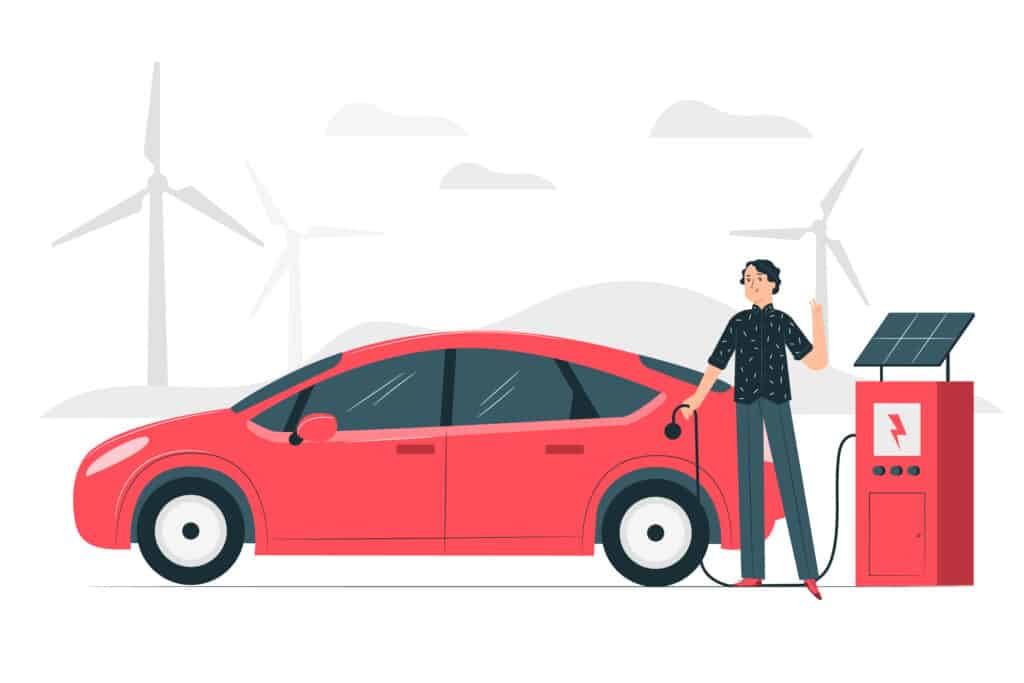Introduction
The Indian market for electric vehicles has seen a slew of new entrants. With the country on track to become the fourth-largest EV market in the world in the next 20 years, entrepreneurs are seizing the chance. Nitin Gadkari, the Union Minister of Road Transport and Highways, has reiterated India’s potential to become a significant manufacturing centre for electric vehicles in the next five years. He claims that the globe has lost interest in doing business with China, which presents an excellent chance for India’s industry to capitalise on the shift in commerce.
The AutoShow 2020, where top automobile manufacturers displayed their latest EVs, reflected the rising interest in India’s EV sector. The interest in these firms is growing as India prepares to become a worldwide leader in electric vehicles. They join other well-funded Indian businesses such as Ather Energy and Triton, located in the United States, who have previously launched or set up shop in India with their electric two-wheelers and four-wheelers.
There’s even Ola Electric, the electric vehicle division of ride-hailing giant Ola, which claims to be developing the world’s largest two-wheeler manufacturing plant. The business believes that its plant in Tamil Nadu will be able to produce 10 million vehicles per year by 2022. With all this happening in the country, it’s really hard for one to argue against the positive growth of EVs in the country in the coming years.
Electric Vehicles In India – Truly Practical?
While the public’s attention has been drawn to self-driving electric vehicles (EVs) that could eventually replace today’s internal-combustion vehicles, the mobility industry has taken several exciting new avenues.
By the end of the decade, we can expect the automotive software market to have increased by about 250 percent. As a result, software will be at the heart of all new car designs.
New levels of mobility also necessitate new types of ability. New mobility players in the area are seen as software or electronics-first businesses, and they have concentrated on hiring digitally savvy employees from the start. Traditional players will have to reskill up to a quarter of their personnel to keep up.
New mobility players have long recognised the benefits of zero-emission vehicles, aiming to reduce both tailpipe emissions (which account for two-thirds of total emissions) and manufacturing emissions (the remaining third). The endeavour is aided by the €1.5 billion European Green Vehicles Initiative. EV sales are expected to increase by 43 percent in 2022, thanks to consumers who consider sustainability while making purchases.

The Biggest Electric Startups In India

In September 2016, Kapil Shelke’s Tork Motors unveiled its first product, claiming to be India’s first electric motorcycle. The startup has since raised money from prominent players in the Indian auto sector, including Ola’s Bhavish Aggarwal, Co-Founder Ola’s Ankit Bhati, and Ratan Tata, the former Chairman of Tata Sons. The company’s first electric motorcycle, the TX6, is anticipated to join the market by July of this year, according to reports.
Despite the fact that the company previously released a Yamaha FZ prototype with an electric motor, it failed to gain traction in the Indian market. Environmental rules and regulations governing emissions gases and fuel technologies are becoming more stringent, and this trend is projected to continue. As a result, Tork Motors has decided to commercialise the powertrain system and electric car components in order to assist other electric vehicle producers. This will assist in minimizing CO2 emissions in the environment and will bring manufacturers together to promote clean technology.
Tork Motors has extensive experience in assisting customers with ideation, planning, design, development, prototyping, testing, and series manufacture of both individual components and full devices.

Jeetender Sharma and Rupali Sharma founded the Indian electric two-wheeler startup Okinawa in Gurugram in 2015. The company claims to be a 100% Indian electric two-wheeler manufacturer, with a manufacturing facility in Bhiwadi, Rajasthan. The company also creates low-cost lithium-ion scooters, which it displayed at the Auto Expo 2020. After the temporary lockdown was removed, the firm sold over 1,000 electric scooters.
In India, Okinawa is one of the most well-known electric scooter manufacturers. In India, the company debuted its first electric two-wheeler in 2017. Okinawa currently has seven electric scooters in its lineup, with prices ranging from Rs 40,000 to Rs 1.14 lakh (ex-showroom). Okinawa, on the other hand, is preparing to release an electric motorcycle in the near future.

Rahul Sharma, a co-founder of Micromax, created Revolt Intellicorp, an electric motorcycle manufacturing company, in April 2019. The company has a manufacturing plant in Manesar that can produce 1.2 lakh units per year. Full LED lighting, Bluetooth connectivity, and a digital display with real-time bike diagnosis are among the bike’s standout features. The business is also developing a café-racer-style motorcycle, which is a lightweight but powerful motorcycle. Revolt Motors is the smart world’s next-generation mobility company.
Revolt will soon unveil India’s first AI-enabled motorcycle without sacrificing the performance or aesthetics of a typical ride, thanks to its technological origins and a class-apart product in the works. The company was founded on August 28, 2017 by Rajiv Rattan, Mohit Mittal, Rahul Sharma, Purushottam Sharma Lal, and Vikas Kumar Adukia.
It is a non-government organisation that is registered with the RoC-Delhi. Revolt Intellicorp’s Annual General Meeting (AGM) was held on December 31, 2020, and its balance statement was last reported on March 31, 2020, according to Ministry of Corporate Affairs (MCA) records.

Batt:RE Electric – the mobility startup’s lineup includes electric bikes as well as electric scooters such as the Lo:EV and IOT. In June 2019, the company launched operations in Maharashtra and Gujarat, and it already has over 50 dealers across six states.The BattRE GpSie electric scooter was just released in India at a price of Rs. 65,000.
The BattRE-One is a new product with premium features like linked instruments, keyless ignition, an anti-theft alarm, and a USB charger. On its e-scooter, BattRE is offering festive season incentives such as a rebate offer and 0% down payment financing choices. The BattRE e-scooter is now available in Nagpur, Hyderabad, Anantapur, and Kurnool for Rs 63,555.
It’s a stylish scooter with features like keyless entry, rear reverse assist, anti-theft alarm with tyre lock, LED lights, and more. A 250W BLDC motor powers the e-scooter, which has a claimed top speed of 25kmph. The scooter’s 48V 30Ah lithium ion battery charges in four hours and has a range of 90 kilometres.A telescopic fork and a single rear shock absorber handle the suspension tasks.

Tarun Mehta and Swapnil Jain started the Bengaluru-based firm in 2013. The 340 and 450 electric scooters, as well as the AtherGrid, an electric vehicle charging infrastructure, were launched by IIT Madras graduates.Hero MotoCorp, Flipkart Co-founder Sachin Bansal, two-wheeler maker, Singapore-based InnoVen Capital, and American hedge fund and venture capital investor Tiger Global have all invested in the firm.
Despite the fact that Ather Energy’s bikes are more expensive, with a starting price of 1,13,000, they have gained popularity in Bengaluru. Ather Energy is an electric vehicle manufacturer specialising in electric scooters. It has also created and designed Ather Grid, one of the fastest electric vehicle charging infrastructures in the world. It makes the Ather 450X and Ather 450 Plus electric scooters.
Closing Thoughts
While EVs are becoming more popular due to reduced taxes, many are still unfamiliar with the technology. As the world progresses toward EV highway consortia, this will be overcome over time. Charging stations and a charge-per-unit basis are also being offered by distribution firms in collaboration with technological partners. At particular locations such as railway stations, airports, and significant civic body buildings, state transportation is inducing EVs into mass transit of people.
These spaces are far more organised, and their infrastructure can easily be converted into charging stations – from parking lot to EV charging station cum parking lot.Because the cost of the battery is still one-third of the automobile, an increase in the number of charging stations will allow a low-capacity battery car to charge at a shorter range. Because recycling Li-ion batteries is still more expensive than mining for lithium, it is assumed that there would be a shortage of batteries as their numbers grow.
In India, earthing protection in electrical infrastructure is not always sufficient. Because of safety provisions, 230 VAC level charging outlets in residences, parking lots, and restaurants may not have correct earthing, resulting in charging errors and vehicles being unable to be charged. To run EVs across the diverse market, a focus on robust earthing system infrastructure is still required.

